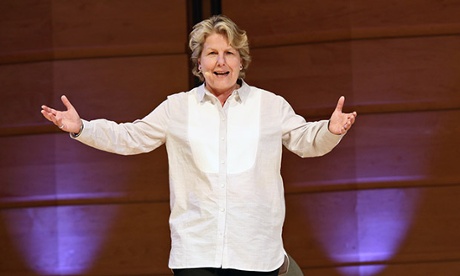
Sandi Toksvig has been in Australia three days, she tells us at the top of her solo performance at the Sydney writers’ festival, and she is now profoundly in love – with Sydney. So, she concludes, she has to be sure to give a strong performance tonight so she’ll be invited back.
Toksvig has been on British television and radio for the better part of 30 years, and judging by the peels of laughter in the audience when she throws up an image of No. 73 many of her fans in Sydney have been with her for the long hall. My Valentine, though, offers as much to Toksvig’s new fans as her old ones – even those who would just be discovering her work for the first time tonight.
My Valentine is Toksvig’s love letter to the world. Following an autobiographical line through her life, Toksvig traces always looking for the good in the world, and the ideas that make her excited. Particularly those ideas around the use of language.
She starts with her parents. Her father was Denmark’s only newsreader, taking up two thirds of their daily 90 minute broadcast, and was thus the most famous man in the country. He met her British mother while learning to broadcast with the BBC, where she was the first women radio producer in Britain – until she was forced to quit upon marriage.
We then move on through Toksvig’s life: early years in Denmark are followed by a childhood move to New York, where Toksvig fell in love with comedy watching the always male, typically Jewish comedians that performed at Coney Island. Later, she was sent to school in England where we hear stories of matrons, and a curious adventure on a wardrobe hovercraft. Toskvig offers a lot of love to her audience, who repay her in peals of laughter.
The show is at its most touching when a homage to her friends and their adventures, and particularly the bond they often shared over the English language – and the puns that can be made with a language which is much more complex than Danish.
She is delighted every time the audience enthusiastically replies yes when she asks if we’ve seen this British television show, or heard that British radio programme. If any of these questions are answered with uncertainty, she tells us we must go hunt it out – these the things Toksvig has loved, and this show is about sharing her love for them with us.
When she was younger, we’re told Toksvig would warm up for a show by drinking two beers. That wouldn’t suit anymore, as she’d have to go to the bathroom part-way through the performance. Instead, she gets her energy up by conducting Beethoven’s Ninth Symphony. As the show comes to a close, she puts on her tails, turns her back on the audience, and begins to conduct again.
The whole audience stands on their feet and conducts, too: a rousing celebration of the music, of Toskvig, and of being just a little bit silly at a writers’ festival. An added bonus, of course, is Toskvig has then perhaps tricked her audience into giving her a standing ovation. But she probably deserves it anyway.

